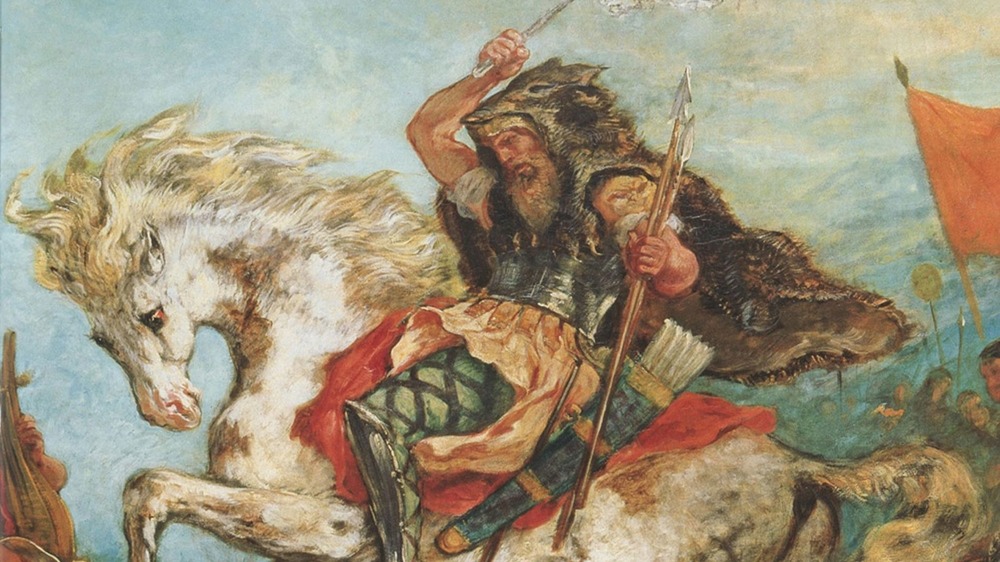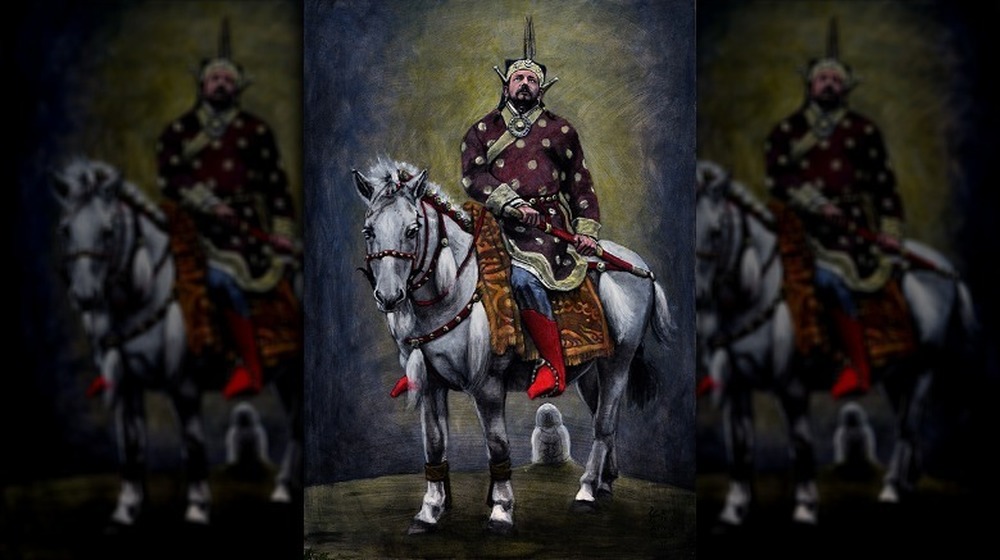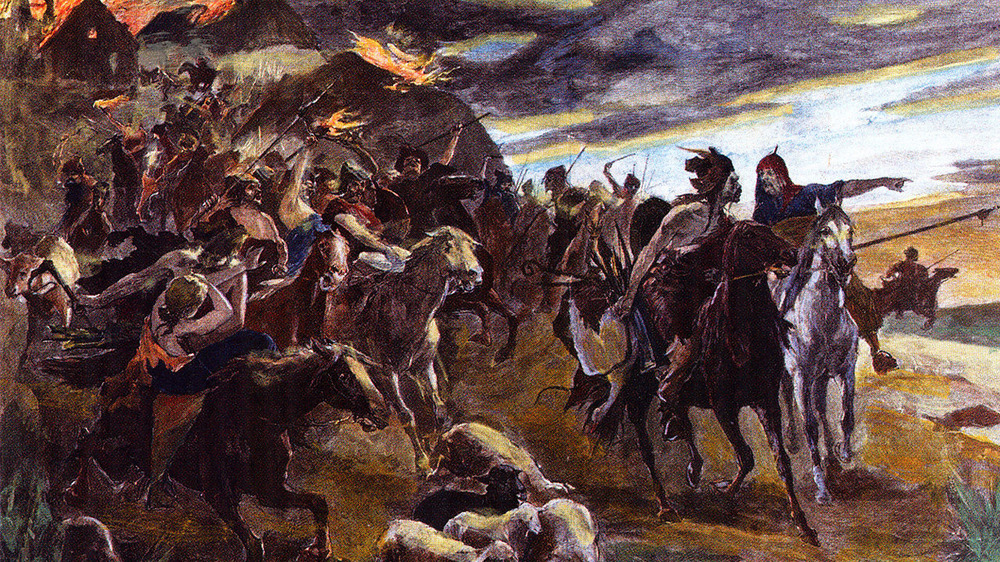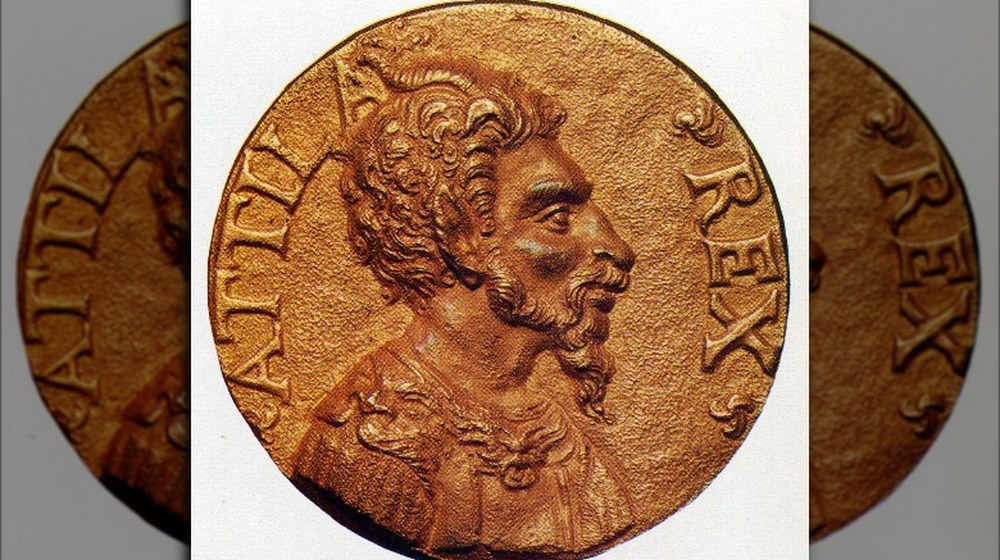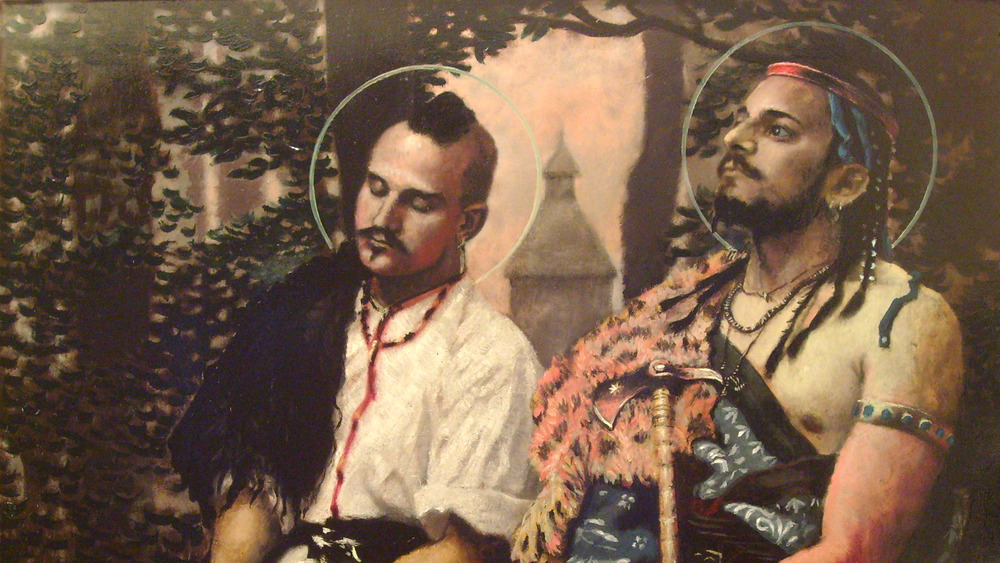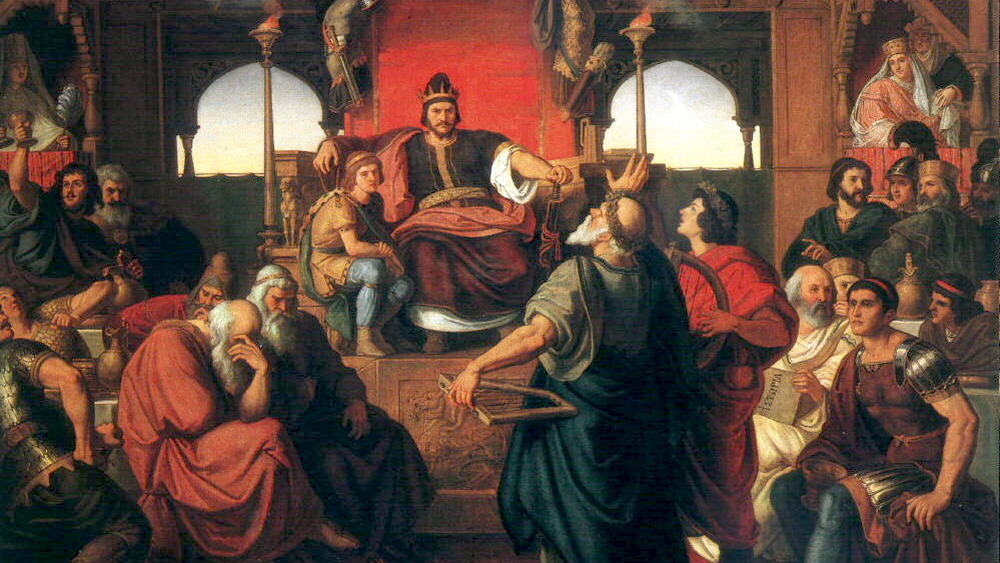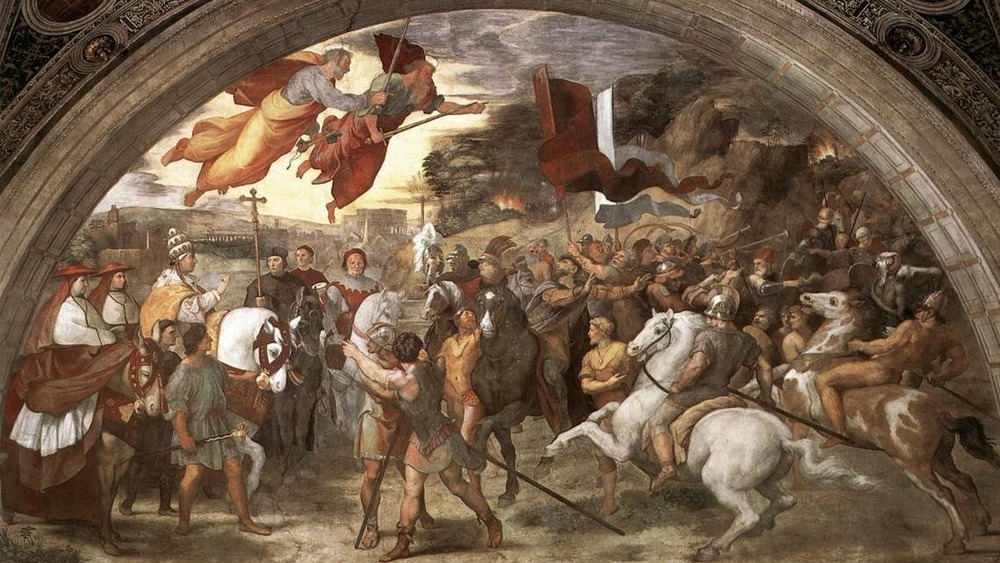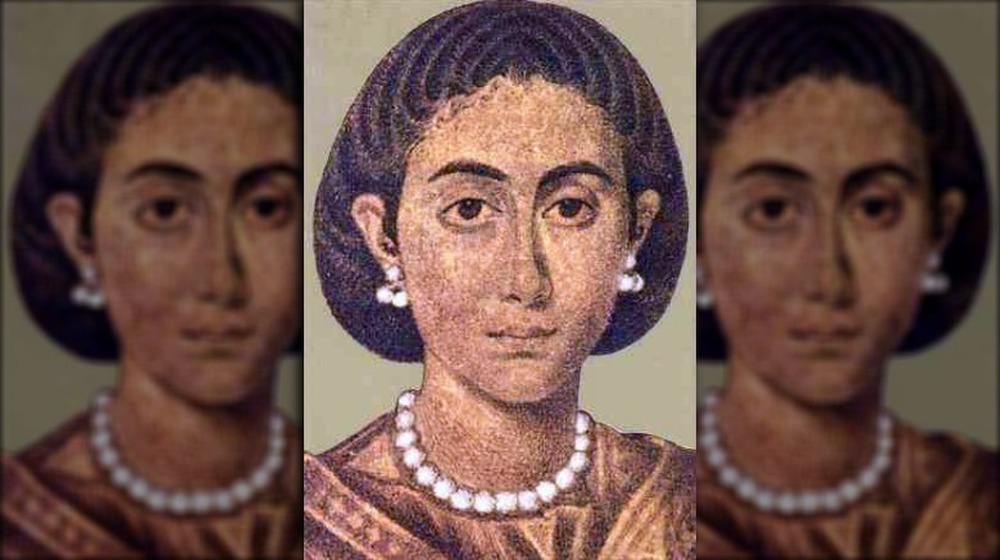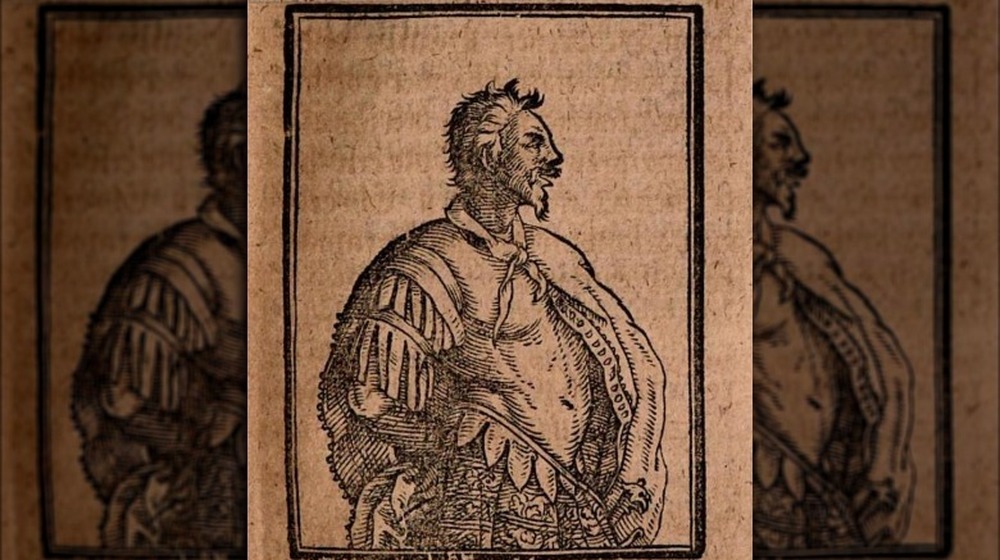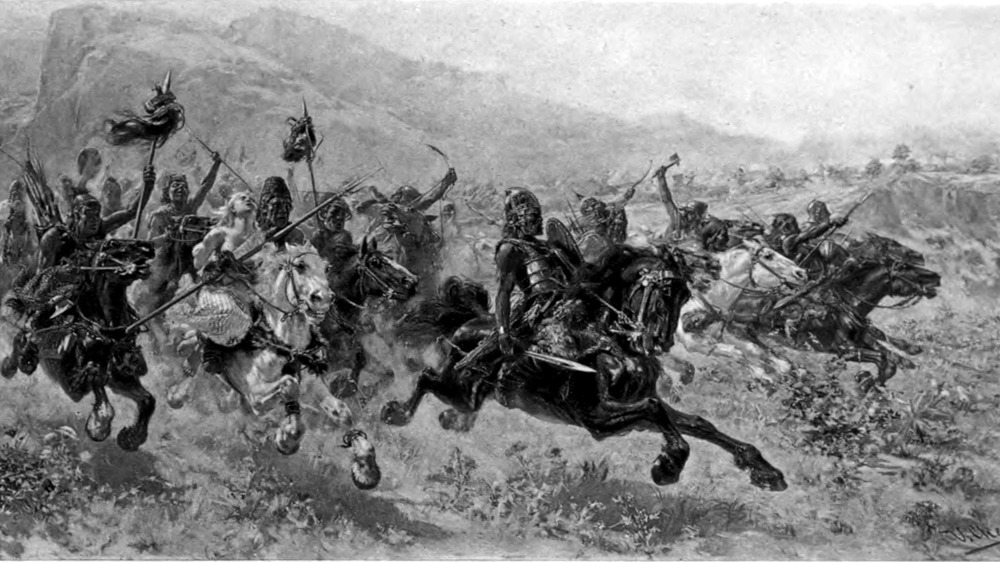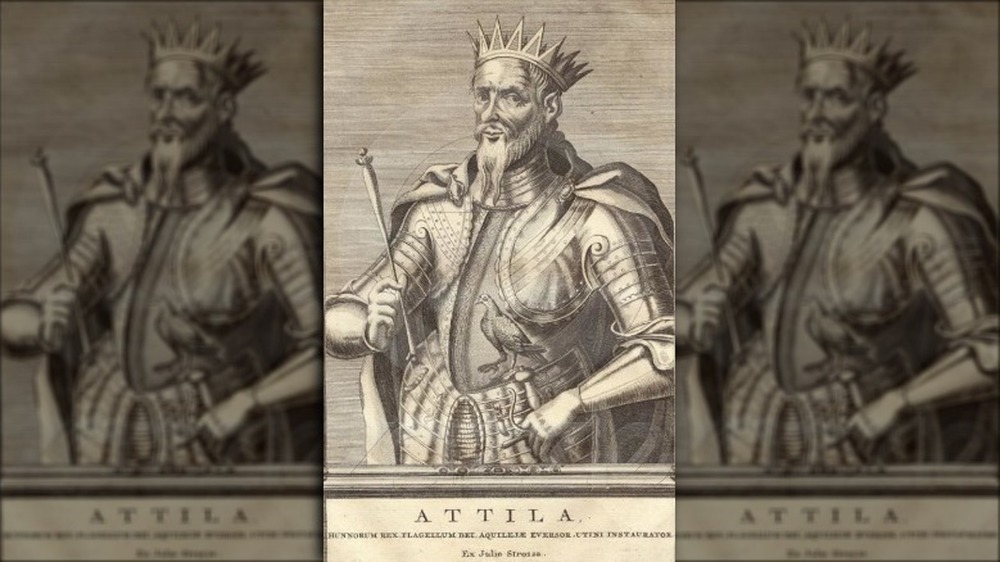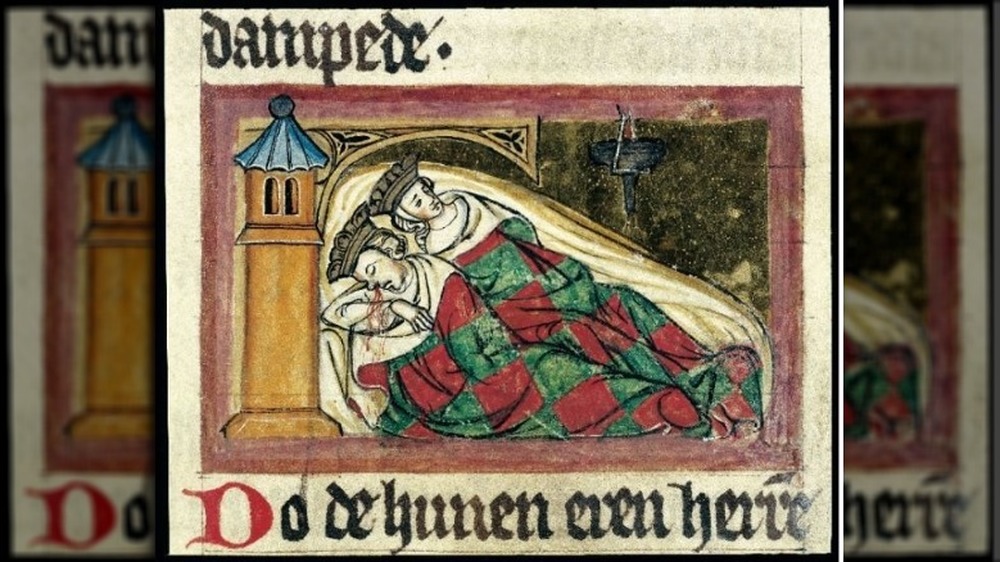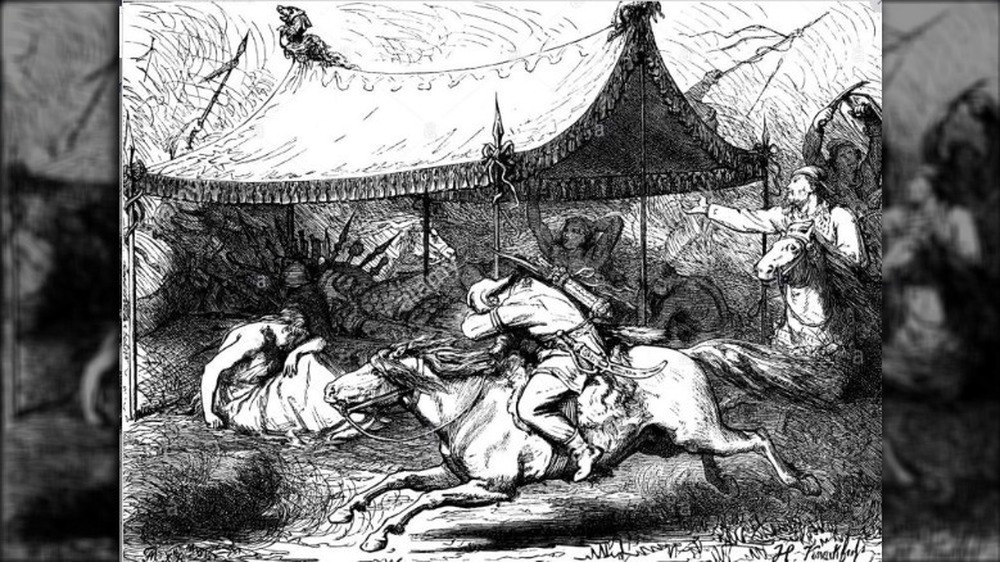False Things You Believe About Attila The Hun
Attila the Hun cuts an intimidating figure across history. The Romans called him "Flagellum Dei," or "Scourge of God," says Britannica, and for good reason. He struck fear into the hearts of both the inhabitants of Christian Rome and non-Roman barbarians alike. That reputation has echoed throughout history, long after Attila's passing in the fifth century. In World War I, BBC's History Extra reports, British and American forces derogatorily nicknamed German soldiers "Huns," referring to their purported barbarity and violence.
But how much is really known about Attila the Hun? Many of the sources that claim to have a lock on this infamous barbarian actually came from the Romans. The state of their empire might have given them a serious bias against outsiders. Back in the third century, History reports, Emperor Diocletian had split the Roman Empire up into western and eastern halves. The exact makeup of those halves would be shuffled around a bit, but, by the time Attila came raiding, Rome was highly fragmented.
Rome, however, had more chroniclers than the Huns, putting them at a long-term advantage. Their depiction of Attila as a ravenous, half-mad conqueror was useful for their image. However, many modern historians suspect that quite a few of the commonly accepted ideas about Attila are just plain false. The story of Attila the Hun is far more intricate and involved than you think.
Attila the Hun wasn't very smart
When you imagine Attila the Hun, you might envision a dirty, barbarous monster, thundering across Asia and Europe as he undertook a single-minded quest to conquer. Whoever got in the way was smashed to pieces by this brutal, brutish man. He somehow brought Christian Rome to its knees, despite being an uneducated warmonger. At least, that's what Rome wanted you to think.
Very little of this is true, it turns out. In fact, as ThoughtCo reports, Attila was born with significant privilege and educational opportunities. Before he was even born, Attila's uncle Rua had united the loose association of Hun clans by killing all the other Hun leaders, placing his family squarely at the top of the resulting power structure.
After this, according to History, Rua and his own brother, Octar, co-ruled from around 420 C.E. in the 430s. Their nephews, Bleda and Attila, were expected to take over once they came of age. This meant that the young boys were instructed in archery, swordsmanship, animal husbandry, military tactics, and diplomacy. They also would have known how to speak Greek and Latin, though it's uncertain if Attila would have known how to read and write in these foreign languages. Either way, Attila could not have risen to prominence within his own society without the right education and a quick, calculating mind.
Much is known about the Huns
For someone who became so legendary, it's odd that little is known about Attila and his people. Even today, no one is sure where the Huns came from or what kind of language they spoke, says the Ancient History Encyclopedia. The first mentions of Huns pop up in a Roman source from 91 C.E., when the historian Tacitus briefly says that they live somewhere around the Caspian Sea, probably in modern day Kazakhstan.
The true history of the Huns is further muddied by all of the propaganda put out by the Romans and other anti-Hun writers. Fourth century historian Ammianus Marcellinus, whom Britannica says gave the first comprehensive report of the Hun lifestyle around 395 C.E., is pretty typical of this mindset, calling the Huns "primitive." The sixth century historian Jordanes goes even farther, saying that the "stunted, foul and puny tribe" of the Huns was born when the barbarian Goths expelled troublesome witches into the wilderness. The witches then mated with unclean spirits in the wastelands, producing the Huns. However, a small contingent of historians like Priscus of Panium, who actually met Attila, are more even-handed when it comes to the Huns, indicating that all of this Roman Hun-bashing is at least partially a very bad case of ancient gossip.
Attila was the "Scourge of God"
As Attila almost certainly knew, utterly destroying every single town and village you encounter doesn't make things easy when you then try to rule over everyone. A good conqueror needs to have a deft touch.
Recent archaeological evidence shows that, contrary to popular belief, the invading Huns often lived alongside Romans and other non-Roman people in relative peace. According to The Washington Post, archaeologists who have uncovered the remains of Huns buried in Europe have found evidence not that they all died of battle-related wounds, but that they lived relatively peacefully in the region, often trading with their European neighbors.
Some ancient people uncovered in a burial ground in the Roman frontier of Pannonia, now in modern-day Hungary, showed traits associated with nomadic groups like the Huns. They also appear to have settled into a more sedentary village-based existence later in life, apparently setting aside their horse riding for agriculture and trade. Some skulls showed evidence of a binding technique used on infants in order to elongate the shape of their heads, which is reportedly an established Hun tradition. While it's also clear that there was plenty of violence and instability in the region, the hints uncovered in these graves from this time indicate that the overall human story was more complex than what some chroniclers would have you believe.
Attila murdered his brother
Attila and his older brother, Bleda, took over the Hun empire in 434 C.E. Things started off pretty well, History reports, when they negotiated a treaty with Emperor Theodosius II of the Eastern Roman Empire, which included a hefty annual payment of 700 pounds of gold to the Huns in order to maintain the peace.
Attila would later claim that the Romans had violated the treaty, leading to his first rampage through Roman settlements in 441. A second peace established in 443 forced Theodosius to cough up an astonishing 2,100 pounds of gold annually. The Huns then retreated to their territory on the Great Hungarian Plain, where Bleda fades away. According to the Ancient History Encyclopedia, the historical record is frustratingly vague. Bleda simply disappeared from many records. Roman chronicler Priscus maintains that Attila ordered Bleda's assassination.
Then again, that could all be more Roman propaganda. Bleda may very well have died in battle, passed peacefully at home, or left this existence in some other manner. Other details make the mystery even more convoluted. As Smithsonian Magazine notes, Bleda's widow was eventually made governor of a Hun village. Was this a payoff, a show of no hard feelings, or something else? The only thing known for sure is that Attila alone emerged as the Hun leader by 445 C.E.
Attila the Hun lived the high life
You would imagine that, between all the regular plunder and gold that Emperor Theodosius II handed over to Attila, that the Hun ruler would be living it up like a Classical era Scrooge McDuck. Surely, Attila had a money pit somewhere or at least drank out of a jeweled goblet like his fellow European rulers often did?
Actually, it appears that Attila wasn't willing to let go of his humbler nomadic lifestyle. Smithsonian Magazine reports that Priscus, a Roman historian, was part of a delegation that visited Attila at his encampment near the Danube River. In fact, Priscus' record is the only first-hand account from anyone who came face-to-face with Attila.
In his account, Priscus described the scene at a banquet held for the Roman ambassadors. Everyone there was honored with a rich feast with gold and silver tableware. Everyone, that is, except for Attila. While everyone else was chowing down on tasty morsels in all their finery, Attila ate only meat off a simple wooden trencher. Priscus reports that Attila also wore simple, unadorned clothing, unlike other Huns who were pretty taken with bejeweled horse bridles and fancy gold detailing on their shoes and clothes. Whether this was a calculated show of humility or simply Attila's personal taste, Priscus was clearly struck by the difference between the fearsome Hun and the rest of the banquet attendees.
Rome fell to Attila the Hun
Though later sources blamed the Huns for the fall of the Roman Empire, Attila never actually invaded the city of Rome. Of course, that fact shouldn't make you believe he was a failure at his chosen task of overtaking much of Europe.
He reportedly spared the city because Pope Leo I, then the bishop of Rome, met with the Hun leader and asked him to show mercy. It may have also been because Attila's own troops were in pretty poor shape by 452 C.E. According to National Geographic, 451 saw the Hun invasion of Gaul. A combined force of Romans and allied Germanic people, including Visigoths, Franks, and Burgundians, defeated Attila at the Battle of the Catalaunian Plains in what is today northeastern France.
The Huns retreated from this loss and went on to overtake major cities in northern Italy, like Milan and Aquileia. Attila reportedly had his eyes on the capital of Rome next, but Pope Leo I convinced him to back off with yet another substantial tribute payment. Biography relates the legend that saints Peter and Paul appeared to Attila and threatened him with divine punishment if he didn't go along with Leo's offer, though there's no evidence that this is anything other than more propaganda courtesy of Christian Rome. Whatever the cause, however, Attila the Hun never overtook the city of Rome.
Attila the Hun only had time for war
Around the year 450, Attila received an enticing letter. According to Attila the Hun, the missive came from Justa Grata Honoria, a Roman princess who was the sister of Emperor Valentinian III. Her brother had forced her engagement, which didn't sit right with Honoria, as she wanted power closer to the throne. The disappointed Honoria acted out in shocking ways before and after the engagement, carrying on affairs that resulted in at least one illegitimate child.
What's a wild, unhappy Roman princess to do when her emperor brother tries to lay down the law? As CNN reports, Honoria wrote to Attila with an offer he couldn't refuse. If he agreed to rescue her from her situation, Honoria would marry him. Attila quickly went to war for her hand.
Lest you think this was all about romance, it's true that there were some other factors influencing Attila's decision. He'd been looking for an excuse to invade Rome for a while. Honoria also would have brought a dowry to the union that included half of the western Roman Empire. While Honoria didn't exactly have the right to offer up half of her brother's kingdom, it was enough for Attila.
As Attila never actually invaded Rome, Honoria never joined his already substantial group of wives. After this incident, she quickly faded from the historic record, having apparently been successfully married off and shuffled away into some obscure estate far from her brother's court.
Attila never lost a battle
Given the way he seemed to move inexorably through fifth century Europe, you might think that Attila was entirely made out of winning. Yet, even the most successful barbarian hordes encounter difficulty every once in a while. For Attila, his biggest defeat came on the Catalaunian Plains in 451.
As National Geographic reports, the Roman Empire was already well into its decline by the time Attila showed up in the fifth century, but it still had some fight left in it. When the Huns tried to face off against Roman forces on the plains just north of modern-day Troyes, France, it looked all set to Attila's advantage. The plains gave his cavalry plenty of room to maneuver. However, the Romans were commanded by Aetius, a general who had spent time with the Huns as part of a hostage exchange.
Thanks to his time with the Huns, Aetius already knew much of Attila's cavalry-heavy playbook. That might be why he forced the Huns to confront his own soldiers between a ridge and a thick forest, creating a chokepoint that seriously weakened the Huns' strategy. The Romans were able to beat back the Huns in a full frontal assault so intense that Attila was forced to withdraw. As ThoughtCo argues, this wasn't the utterly humiliating defeat that chroniclers said it was — Attila did retreat with a large amount of plundered loot — but the Battle of the Catalaunian Plains remains his biggest battleground loss.
Attila knew nothing about strategy
In the centuries after Attila the Hun plundered and battled his way across Europe, many historians and writers have perpetuated the image of Attila as a bloodthirsty, nearly mindless conqueror. Attila and his Huns couldn't really be that way, however. While the Roman Empire had split into eastern and western halves and was greatly diminished from its height of power and influence, it was still nothing to sneeze at. Attila wouldn't have reached the kind of notoriety that he did if he didn't use his brain as much as he did his sword.
Take the assassination plot against Attila. According to Smithsonian Magazine, when Attila uncovered the attempt, the would-be assassin probably assumed that he was about to face something really hideous. Instead, Attila must have realized that there was a new opportunity here that didn't necessarily call for gratuitous bloodshed. Instead of maiming the assassin, Attila sent the man back to Constantinople. He carried a letter that detailed exactly how Attila uncovered the plot, presumably to embarrass the Romans, who may have assumed that a dumb barbarian wouldn't have figured it out. That letter also carried a demand for yet more tribute.
Attila always went back on his word
Attila generally kept his promises. The terms of these promises weren't always fair, at least if you ask the Romans who had to pay thousands of pounds of gold in tribute to Attila. But, if you stuck to the agreement and minded your own business, Attila would tell his fellow Huns to back off.
Furthermore, as Smithsonian Magazine points out, Attila held his own forces to a relatively high standard. He told the Romans that any trouble-causing Huns should be handed over to him for punishment. Their fate, which sometimes included gory punishments like impalement for the worst offenders, was nothing to be envied. Those who stayed loyal to him, including Roman subjects who switched sides, could expect to benefit from Attila's generosity with those rich Roman tribute payments.
To be fair, things got tricky when a situation was interpreted differently by the two sides. According to the Ancient History Encyclopedia, Attila claimed that he had to break the treaty brokered in 435 C.E. because Rome had failed to return refugee Huns. Even worse, Attila said, a Roman bishop had snuck into their territory and begun desecrating Hun graves. Rome refused to turn over the bishop and said there were no refugees in their territory, which later proved to be false. Attila took this as an excuse to begin — you guessed it — yet more plundering.
Attila died on the battlefield
It would make sense for Attila to have died in the midst of battle. That image certainly fits with all of the stories about fearsome warriors who met their ends fighting the enemy in chaotic, violent skirmishes. Attila, however, didn't go out that way. Indeed, he was probably extra comfortable, as he died suddenly on his wedding night.
As per ThoughtCo, Attila reportedly passed shortly after marrying Ildico, a young woman who was the latest addition to his group of wives. Attila married Ildico in 453 C.E., held a large feast to celebrate, and then retired to a private chamber with his new wife. In the morning, guards found Ildico weeping over Attila's body. The Hun leader had no apparent wounds, but it appeared that he had lost a large amount of blood through his nose and mouth.
The most commonly accepted interpretation is that Attila had gotten very drunk, passed out, and then choked on a massive nosebleed or esophageal hemorrhage. Some pointed to alcohol poisoning. Others wondered if Ildico could have been a double agent employed by the Romans to assassinate the troublesome Attila. Priscus, the Roman diplomat who actually met Attila, suggests that the Hun died of a burst blood vessel exacerbated by years of heavy alcohol consumption.
Attila the Hun's gravesite has been found
You might think that Attila was laid to rest like in other famous burials where the deceased couldn't help but leave their mark, from the Great Pyramid of Giza to Mausoleum at Halicarnassus. Indeed, according to The End of Empire, the grieving Huns did send their leader off in style. He was honored by a day of games, followed by burial in three sarcophagi made out of gold, silver, and iron, along with other treasures and plundered enemy weapons. Some further state that the gravediggers were executed in order to take the secret of Attila's burial site to their own graves.
For all that glory, no one's ever found Attila's burial site. ThoughtCo reports that some people claimed to have uncovered it, though no one's ever produced definitive evidence. One legend says that the Huns went so far as to divert a river, then buried Attila in the riverbed before allowing the waters to return to their course. If he was buried deep enough that the river couldn't wash away the grave in the intervening centuries, then Attila may still be entombed beneath a waterway somewhere. So far, however, that's only a legend. As it stands, no one has found Attila's remains since they were first buried in the fifth century.
